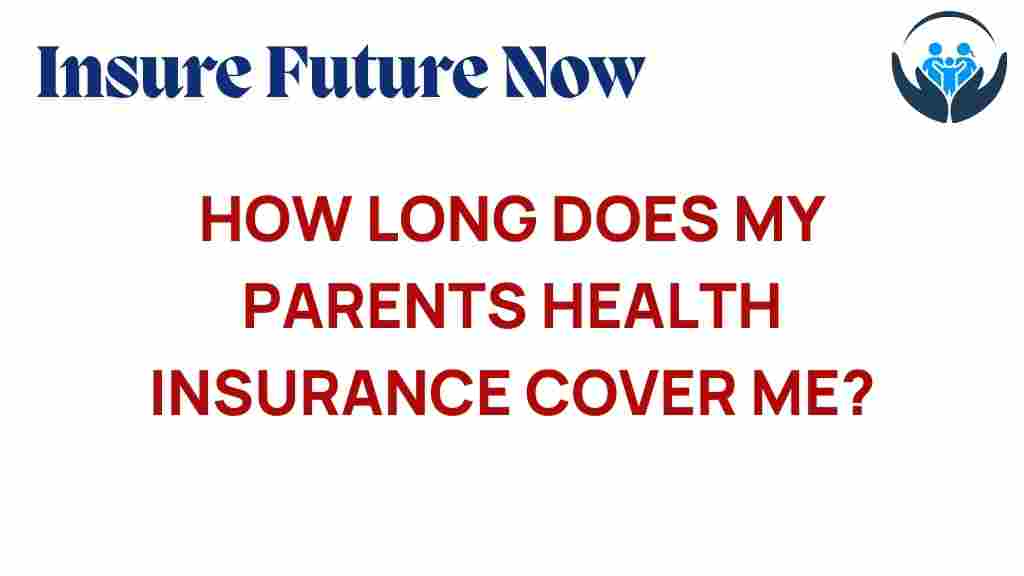Unraveling the Mystery: How Long Does Parental Health Insurance Cover You?
When it comes to understanding parental health insurance, one of the most common questions revolves around the coverage duration. Many young adults and their parents are often left in the dark about how long they can remain covered under their parents’ health insurance policies. In this article, we will explore the intricacies of dependent coverage, the various health insurance rules that apply, age limits, and more. Understanding these elements is crucial for maximizing your healthcare benefits and ensuring you are prepared for any changes in your health coverage.
Understanding Parental Health Insurance
Parental health insurance typically refers to the coverage provided by a parent’s health insurance policy that extends to their children as dependents. This coverage is designed to ensure that children have access to necessary medical services without the financial burden that can often accompany healthcare costs.
There are various types of insurance policies that may offer family plans including employer-sponsored plans, individual marketplace plans, and government programs such as Medicaid and CHIP. Each of these may have different rules regarding coverage duration and eligibility for dependents.
How Long Does Coverage Last?
Generally, the duration of dependent coverage under parental health insurance can vary. Here are the key factors that influence how long you can stay on your parents’ plan:
- Age Limits: Most health insurance plans allow dependents to remain covered until they reach a specific age, usually 26 years old. This was established under the Affordable Care Act (ACA), which mandates that young adults can remain on their parent’s plan until this age.
- Full-Time Student Status: Some insurers may have provisions that extend coverage beyond age 26 if the dependent is a full-time student. However, this can vary by state and insurance provider.
- Marriage or Independence: If a dependent gets married or becomes financially independent, they may lose eligibility for parental coverage.
- Special Circumstances: In certain situations, such as a disability, coverage may continue beyond the typical age limit. It’s essential to check with your insurance provider for specific details.
Health Insurance Rules: What You Need to Know
Understanding the basic health insurance rules regarding parental health insurance is essential for making informed decisions. Here are some critical points to consider:
- Open Enrollment Periods: There are specific times of the year when you can enroll or make changes to your health insurance plan. If you are aging out of your parent’s plan, it’s crucial to be aware of these periods to avoid lapses in coverage.
- COBRA Coverage: If you lose coverage under your parent’s plan, you may be eligible for COBRA, which allows you to stay on the plan for a limited time—usually 18 months—after losing eligibility.
- Marketplace Options: If you are no longer eligible for your parent’s plan, you can explore health insurance options on the Health Insurance Marketplace, where you may qualify for subsidies based on your income.
Step-by-Step Process for Transitioning Off Parental Coverage
Transitioning off parental health insurance can be daunting, but with a systematic approach, you can navigate this process smoothly. Here’s a step-by-step guide:
- Check Your Coverage Duration: Confirm when your current coverage ends. If you are near your 26th birthday, start planning ahead.
- Review Your Options: Look into other health insurance options available to you, such as employer-sponsored plans, marketplace plans, or government programs.
- Compare Plans: Take the time to compare different insurance policies. Look at premiums, deductibles, out-of-pocket costs, and coverage benefits.
- Apply for Coverage: Once you’ve chosen a plan, apply for coverage as soon as possible to avoid any gaps.
- Notify Your Parents: It’s important to keep your parents informed about your transition and any decisions you make regarding your health insurance.
Troubleshooting Common Issues
While navigating parental health insurance, you may encounter some common issues. Here are troubleshooting tips to help you address them:
- Eligibility Confusion: If you are unsure about your eligibility, contact your insurance provider directly for clarification.
- Coverage Gaps: If you find yourself without coverage, consider applying for a short-term health insurance policy while you secure long-term coverage.
- Understanding Benefits: If you are confused about what your plan covers, request a summary of benefits from your insurer to clarify any uncertainties.
Conclusion
Understanding the nuances of parental health insurance and the coverage duration it provides is essential for young adults transitioning into independence. By familiarizing yourself with the age limits, health insurance rules, and available options, you can ensure that you maintain adequate healthcare coverage. Remember to stay proactive about your insurance needs, and don’t hesitate to reach out to your insurance provider for assistance.
For more information on health insurance options available to young adults, consider visiting healthcare.gov for resources and guidance. Additionally, you can learn more about family plans and their benefits on our site here.
This article is in the category Coverage and created by InsureFutureNow Team
